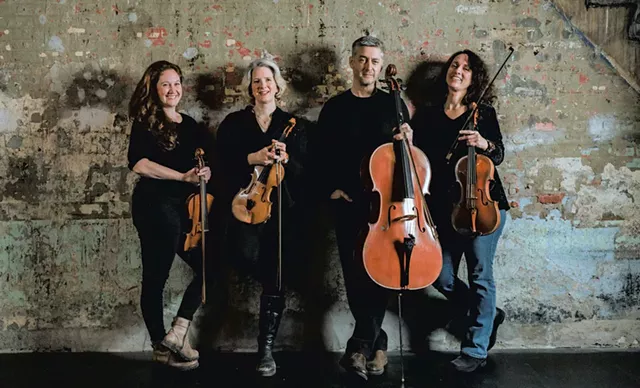click to enlarge

-
Courtesy of Macaulay Lerman
- VSO Jukebox Quartet
Can a string quartet make you headbang? The Vermont Symphony Orchestra’s Jukebox aim to find out with their new show, “Heavy Metal Strings.” The hourlong performance will blend the thunderous precision of classical composers such as Felix Mendelssohn with the intensity of rock and metal legends Eddie Van Halen, Nirvana and others.
The series kicks off its six-show run this Friday, April 4, at the Paramount Theatre in Rutland, where the audience will be seated onstage with the quartet to create a more intimate performance. The tour then moves through venues in Brattleboro, White River Junction and Burlington, before drawing to a close at the Bennington Museum.
Roughly half the program consists of popular rock and metal ballads arranged for strings — think Led Zeppelin’s 1971 masterpiece “Stairway to Heaven” and Tool’s 1996 song “Forty Six & 2.” Cellist John Dunlop said the show is about using a string quartet, a form that goes back 250 years or so, to give voice to harmonies and rhythms that modern musicians have played in the past 50 years. “There’s no question that a lot of the great rock and rollers were students of classical music in their youth,” he said.
Translating rock and metal for strings in this year’s show meant “doing a lot of choreography with pedals,” according to composer and VSO artistic adviser Matt LaRocca, who curates and hosts the Jukebox series.
Violinist Brooke Quiggins-Saulnier will run her instrument through several guitar pedals as she plays Eddie Van Halen’s 1976 electric guitar solo “Eruption.” According to LaRocca, “She just shreds on it.”
LaRocca had a violin in hand while arranging the piece, which he described as “like a million and a half notes, played in about two minutes of extreme virtuosity.” Any composer would need to think deeply about how strings are designed and played, he said, in order to translate Van Halen’s “über-specific guitar solo” to violin. “It has to sit perfectly on the players’ fingers.”
Similar considerations influenced the rest of the program as the quartet, which also includes violinist Joana Genova and violist Stefanie Taylor, replicates the sounds of percussion and electric guitars. They’ll use their bows to hit the strings sharply with a vertical motion — known as “chopping” — to mimic a snare drum. And they’ll utilize a method called ponticello, essentially playing the bow close to the bridge of the instrument. “You get this great kind of distorted, metallic quality,” Dunlop said.
The cellist, who joined the VSO more than 30 years ago, will be playing Baltimore-based composer Judah Adashi’s “my heart comes undone” — a solo piece that draws on elements from Björk’s song “Unravel,” which itself blends electronic elements with orchestral arrangements. It will be Dunlop’s first time performing with a looping pedal. The effect? According to LaRocca, “this beautiful, ambient dreamscape of a sound.”
Transcribing popular rock and heavy metal is ultimately an interpretation, LaRocca said. “You can’t just try to translate a piece perfectly and exactly to the quartet. It doesn’t really work like that.”
He pointed to a particular song on the program: “In Bloom,” from Nirvana’s 1991 album, Nevermind. It was arranged by Kyle Saulnier — the spouse of quartet violinist Quiggins-Saulnier. “It starts out nothing like the original piece,” LaRocca said, “but eventually you arrive at a section that’s roaring through with the main melody that [Kurt] Cobain sings. It really takes you on a journey to get there.”
The other half of the program features several heavy, dynamic classical compositions spanning the 19th century to the present, including a movement by the Russian composer Dmitri Shostakovich, who spent much of his musical career navigating an increasingly oppressive political climate in the Soviet Union. “He wrote politically driven, dissent-ful stuff,” LaRocca said. “Some of the heaviest-hitting music ever.”
One might expect to hear this kind of music in large arenas and concert halls. Yet a goal of the Jukebox series over the years has been to eliminate the gulf between the ensemble and the audience by performing in smaller, more intimate spaces. That close proximity creates “a back-and-forth that we would otherwise miss in larger venues,” LaRocca said.
He likened the feel of Jukebox to “salon concerts” — intimate, mostly classical musical performances held in private homes, as an alternative to formal concert halls, in 18th- and 19th-century Europe. According to music historians, that cozy form made a resurgence in the 1980s and ’90s, and LaRocca sees it as continuing to gain momentum.
The quartet, now in its ninth year, has played rock songs in past programs, making this year’s show a stronger focus on a familiar genre. The group will also perform a spin-off show for kids and families, called the “Juicebox” series, on Saturday, April 5, at Brattleboro Music Center and Sunday, April 6, at Northern Stage in White River Junction. That program explores emotions using Todd Parr’s children’s book The Feelings Book, while — similar to “Heavy Metal Strings” — featuring a mashup of Johann Sebastian Bach, Ludwig van Beethoven, Talking Heads and other, modern musicians.
“On the surface, these genres seem pretty disparate,” LaRocca said. “But the second you start pulling in a little closer and digging a little deeper, they’re really not.”
